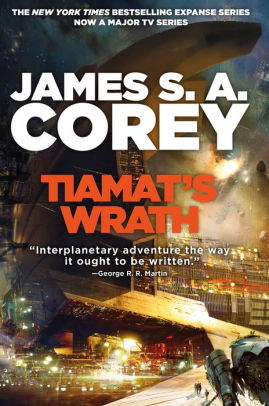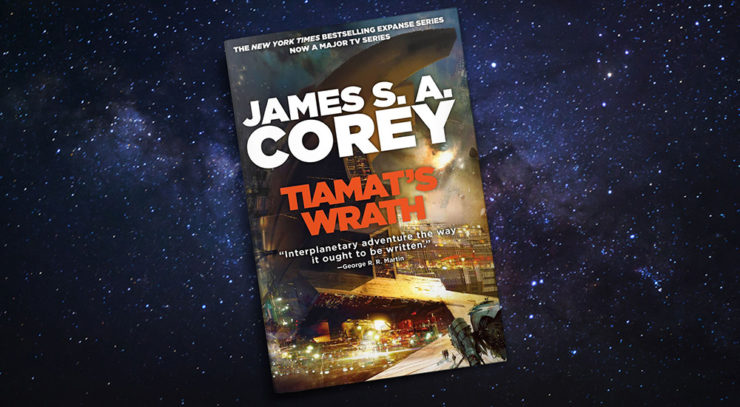Time passes. The things you love lose their lustre. Your nearest and dearest die. And sooner or later, it dawns on you that you will too. So when you see the end ahead, what then? Well, if you’re anything like the friends who became a family aboard the gunship Rocinante, you do what you’ve always done: you fight for what’s right, even when what’s right is difficult to picture in a galaxy gone wrong on your watch.
At this late stage in the high-stakes game the architects of The Expanse have been playing, Gunnery Sergeant Bobbie Draper’s greatest desire is to die “with the knowledge that humanity’s a little bit better off that it would have been if I’d never been born. A little freer. A little kinder. A little smarter. That the bullies and bastards and sadists got their teeth into a few less people because of me” is what what’s right looks like to her, and in Tiamat’s Wrath, the penultimate volume of James S. A. Corey’s celebrated sci-fi saga, her wish may well come true. Indeed, now that the end is near, not a few of the folks we’ve come to care for over the course of this sensational story are fixing to face the final curtain, and as sorry as readers will be to bid them goodbye, at least we’ll be able to say that hey, they did it their way.
Bobbie’s always been the ground pounder of the group, in truth, so it’s hardly surprising that she thinks in such dramatic terms: everything’s a question of life or death when you’re on the front lines of every fight. Matters of grand strategy she’s always left to the likes of her captain on the Rocinante, but with old James Holden indisposed at the moment—having been captured by Laconian forces in Persepolis Rising and essentially exhibited as part of High Consul Winston Duarte’s “dog and pony show” in the years that pass before the events of Tiamat’s Wrath—his leadership role has fallen to Naomi Nagata, who finds herself second in command not of her usual crew, but the whole of a ragtag resistance movement.
Now there’s no shortage of things to resist. When in the last volume of The Expanse the dastardly Duarte reappeared from the ring gates complete with a fleet of ships designed to make use of the power of the unpredictable protomolecule, he promptly stomped on the combined forces of Earth, Mars, the Transport Union and the OPA before declaring himself emperor of the entirety of humanity, making “every planet […] a prison” in the process.
If not necessarily outnumbered then completely and utterly outgunned, most folks, believing themselves defeated, eventually fell in line with the empire in the following years—most folks, but not all. Not Bobbie, not Holden, not Alex, not Amos, and certainly not Naomi. Yet for all her efforts—and for all the efforts of an incredibly capable crew—and for all the efforts of their courageous compatriots—things… haven’t been going great. Nothing that the resistance has done seems to have mattered, and in the interim, Naomi has lost so much:
And it wasn’t only Jim, though he had been the first. Naomi had also lost Clarissa, who would have died from the slow poisons in her implants if she hadn’t chosen to die by violence. Amos had taken a high-risk mission from the underground, deep in enemy territory, and then gone silent, missing pickup window after pickup window until they all stopped expecting to hear from him again. Even Bobbie, healthy and well, but in the captain’s seat of her own ship now [with Alex as her pilot]. They were all lost to her, but Jim was the worst.
And all Jim can do from his supposedly open prison on Laconia, where he’s watched around the clock and trotted out on special occasions to remind the resistance of its frailty in the face of the empire’s unfettered strength—all Jim can do is joke about the plans he may or may not have. Perhaps there’s some truth, after all, to Bobbie’s bleakly binary belief that “in a fight like this, unless you’re willing to lose everything to win, you lose it all by losing.”
As is tradition in The Expanse, Tiamat’s Wrath brings several new perspectives into play. In the first there’s Teresa, Duarte’s only daughter. She may have been loved, and looked after, but she’s also a teenager at the time of this text, and when her father starts sharing his schemes with her, hoping that she’ll pick up where he leaves off in the event that—heaven forfend—anything untoward should happen to him, Teresa begins to wonder whether she’s on the right side of the fight her daddy started.
There’s also Elvi, returning from Cibola Burn. Having “made the mistake of becoming humanity’s leading expert on the protomolecule, the vanished civilisation that had created it, and the doom that had wiped it out,” Elvi has been headhunted by the High Consul and asked to undertake an appealing scientific mission: she’s to seek out and study the remnants and remains of said dead civilisation in the previously unreachable systems that have suddenly become accessible thanks to the reactivation of the aforementioned ring gates—and all this aboard a top-of-the-line, specifically equipped ship. As such, in spite their earlier differences of opinion, she’s somewhat sympathetic to Duarte and his domain at the outset of Tiamat’s Wrath:
Laconia by and large left people alone. Planets elected their own governors and representatives to the Association of Worlds. They could establish their own laws, as long as they didn’t directly contravene imperial law. And unlike most dictatorships in history, Laconia seemed uninterested in restricting higher education. The universities of the galaxy functioned pretty much like they had before the takeover. Sometimes even a little better.
But when Duarte’s right hand man commands her to attack the unknown entity that decimated the creators of the protomolecule, ostensibly to see if it can be hurt, even Elvi begins to wish for a way out of the catastrophe she’s sure will come. And maybe—just maybe—if she and Teresa and Holden and Naomi and Bobbie et al can coordinate their futile individual efforts, they might just find one. Let’s face it though: it’s blindingly unlikely.
Tiamat’s Wrath is a terrific addition to the trilogy of trilogies that comprise The Expanse which, though never less than entertaining, have waxed and waned in their proximity to greatness since the publication of Leviathan’s Wake. Some volumes of the series felt tertiary at the time, and others, looking back, were almost certainly supplementary even though they didn’t seem so. It’s to the credit of Daniel Abraham and Ty Franck, the two authors behind the pseudonym attached to The Expanse, that these third wheels and the wheels within them spun so quickly and so compellingly that it was often tough to tell they weren’t taking us anywhere.
Happily, there’s none of that in Tiamat’s Wrath. The big picture is finally in the frame. I’m hesitant even now to say that the real threat has emerged—honestly, who knows in a James S. A. Corey story?—but everything that happens here feels meaningful. No longer are the movements towards the endgame incremental; in this penultimate part of the saga, The Expanse’s overarching narrative progresses in leaps and bounds, with an irresistible impression of momentum, and a sense that all this, for good or for ill, will stick—not least because after the events of Tiamat’s Wrath, there’s simply no going back.
Buy the Book


Tiamat’s Wrath
But not all of those events are of the explosive, galaxy-spanning variety. You can also count on a handful of the smaller, character-focused moments that have made The Expanse so much more than the brainless blockbuster it might have been in the hands of other, less accomplished authors. There are reunions, rediscoveries, romances and rebellions; there’s humour, there’s hysteria and, yes, there’s heartbreak. I dare say I was a little disappointed with Alex’s nominal part in Tiamat’s Wrath—he remains the least developed of the crewmembers that have been The Expanse’s core characters—and I already miss Chrisjen Avasarala immensely; everyone else, however—up to and including newcomers Teresa and Elvi—has his or her time to shine in this appropriately lengthy text.
Speaking of length, it bears saying that, almost a decade since its conception, The Expanse is officially old—as are its characters, almost all of whom have grown grey and started taking various medications. Even the Rocinante, the gunship that once represented the cutting edge in interstellar tech, is practically an antique:
The Roci was an old ship now. She’d never be state of the art again. But like old tools, well used and well cared for, she’d become something more than plating and wire, conduits and storage and sensor arrays. Old Rokku had said that after fifty years flying, a ship had a soul. It had seemed like a cute superstition when [Naomi] was young. It seemed obvious now.
Like the Roci, The Expanse may be getting on, but as worn and torn as it’s inevitably been over the years, the love that it’s been lavished with has ensured that it’s become something far greater than the sum of its past-their-best bits and bobs. Tiamat’s Wrath, for its part, gives no sense that said series is growing long in the tooth at all, and with just one more volume to go before the whole of this stellar story’s over, The Expanse is looking likely to go out the way it came in: fighting for what’s right.
Tiamat’s Wrath is available from Orbit.
Niall Alexander is the manager of an extra-curricular education centre, and also, increasingly occasionally, a reader and a writer. He lives with about a bazillion books, his better half and a certain sleekit wee beastie in the central belt of bonnie Scotland.










